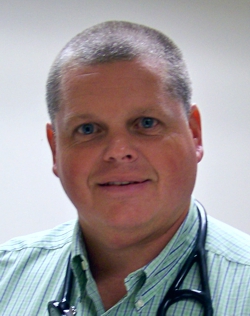A Rural Community Overcomes Barriers to Colorectal Cancer Screening
Posted on byBy Van S. Breeding, MD
Director of Clinical Affairs and Family Practice Physician
Whitesburg, Kentucky

Director of Clinical Affairs and Family Practice Physician
Whitesburg, Kentucky
I’m the Director of Clinical Affairs for a community health center in rural southeast Kentucky. Our service area includes multiple counties that have some of the highest rates of cancer and death from cancer in the United States. Colonoscopy screens for colorectal cancer and can prevent it by finding precancerous polyps. However, in our community health center, we had a dismal record of getting patients in for proper screening. Only about 16% of eligible patients were getting the screening they needed. I wondered what was preventing people from getting these life-saving screenings. The barriers seemed to be financial, cultural, and personal—such as fear of having a colonoscopy.
I can identify with this. At the same time this was going on, I reached my 50th birthday, and it was time for my own screening colonoscopy. While looking into having mine done, I realized that there were barriers to having this preventive procedure, even for myself. Getting the colonoscopy required three separate appointments and three days off from work. In an area of high unemployment, it is difficult to get off even half a day of work.
Not only did this open my eyes to the barrier of time off from work to get the screening done and the cost, it also opened my eyes to the risk that not getting screened poses to our families.
We set up a task force to get information to our patients who needed to be screened. The Affordable Care Act helped us overcome financial barriers because it requires most insurance companies to cover the full cost of a colonoscopy, with no copay for patients. We also had a program through the state health department that provided free colonoscopies for those who did not have adequate insurance coverage.
We overcame the time barrier by partnering with a local hospital system. Though it was unfortunately three hours from our service area, we were able to set up a local outreach center. Working with our local hospital, we arranged for screening colonoscopies to be done on Mondays and Fridays.
The task force worked with our scheduling staff, check-in nurses, quality team, and medical providers to identify every person who was at risk and needed an early screening colonoscopy at age 40 because of family history, or who was in the age group of 50 to 75 years for routine screening.
We worked with nurses, the hospital, and providers to make the system easy to set up and easy for the patient to participate in. Some patients preferred to be screened with the FIT (fecal immunochemical test), another type of recommended test, which is repeated yearly.
As a personal champion for screening colonoscopies, I used my own story, along with stories of people under the age of 50 in our community who had gone through colonoscopies, in order to encourage our patients to get screened. After personally reassuring them of the ease of the procedure, helping with the fear of the prep, and then showing them that they will be comfortable during the procedure, we were able to gain ground on patient trust and get them scheduled for their colonoscopies.
While we have improved our rates, our goal is to get 100% of patients in the recommended age group screened, either with colonoscopies or with yearly FIT tests, so that the high level of colon cancer in our area can be adequately screened for and corrected with minimal treatment. I share my personal story with everyone, hoping that both professionals and patients will realize that we all have barriers—and we can all overcome them together as a community.
Posted on by

